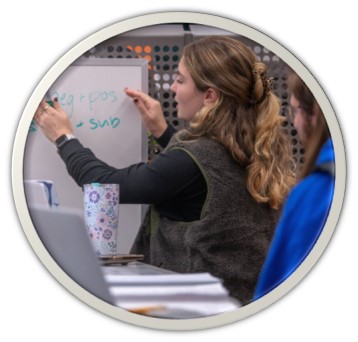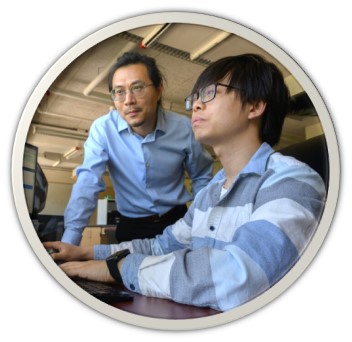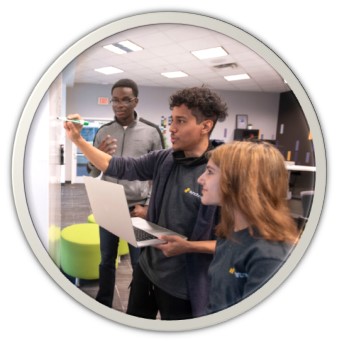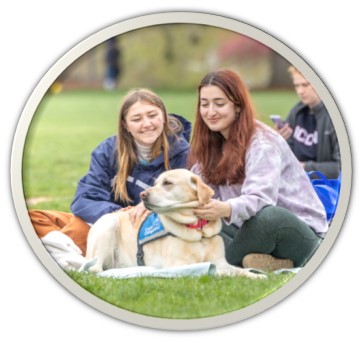Network for Enriched Mentorship
“A profusion of research over the past two decades has confirmed the significance and profound impact of faculty mentorship on the success of graduate students.” (Research in Higher Education Journal)
Welcome to the Network for Enriched Mentorship
The Graduate School's Network for Enriched Mentorship (NEM) is a UConn-wide interdisciplinary mentoring network for all graduate students, with a special focus on minoritized graduate students and those who come from backgrounds that may disadvantage them. Through NEM, graduate students can find mentors to talk with them about issues that arise outside of their coursework and dissertations. We hope that by connecting students with mentors who have experience navigating obstacles (e.g., systemic bias, personal hardship, alternative career trajectories) or who can be effective and accountable allies, more students will feel supported and assertive in their graduate careers and beyond.
If you haven't already, we invite you to apply to be a mentor. If you have already applied, we appreciate your interest in supporting graduate students and look forward to matching you with a mentee. We recommend meeting monthly with your mentee. At the end of the academic year, I will acknowledge your service with a letter that will be copied to your department head and dean, and The Graduate School will invite you and your mentee to join us at an end-of-the-year celebration. If you are a graduate student interested in participating in NEM, we welcome you to sign up to be a mentee.
This website provides a variety of resources you may find useful as you take on this mentorship role. The resources include both general advice on how to mentor graduate students and specific resources available at UConn that your mentees find valuable. A recent survey of graduate students at UConn showed that the mentorship graduate faculty provide is one of the things they value most highly about their education. Their feelings are consistent with more than two decades of research that also shows that graduate student success is strongly correlated with strong student-faculty relationships built on a foundation of integrity and trust (Research in Higher Education Journal). We appreciate your willingness to join us as a part of NEM.
If you have questions about things that you can’t find the answer to here, please let us know by emailing gradschool@uconn.edu. We look forward to receiving your comments and suggestions as we all work to help our students succeed.

The Graduate School is here to support NEM mentors and mentees. Below are a few of the ways we can help. Always feel free to reach out to gradschool@uconn.edu if the type of assistance you are looking for is not easily found--we are here to help.
Graduate School Support for Mentors
In addition to the information gathered on this webpage, The Graduate School has these sources of support available for mentors:
- The Graduate School has gathered resources on our Advising and Mentoring webpage to help you provide the best support to your graduate students.
- The Graduate Faculty Council (GFC) provides leadership in developing academic policies. Each academic department has a representative that serves on GFC, so you can always reach out to your department rep if you have questions or concerns that you believe the Council should consider.
- In addition to several of the resources highlighted on this page, the Graduate Faculty Onboarding page provides more specific information related to advising students on their course of study.
- The Graduate School staff are available to support mentors and mentees.
- Timely Topics is a series of opportunities to engage with subject matter experts on topics relevant to those who support and advise graduate students and programs. Many of the sessions focus on topics that graduate faculty will find helpful, such as Information for New Graduate Faculty Advisors, Advising International Students, and Supporting Graduate Students with Disabilities. All are welcome to attend.
Graduate School Support for Mentees
In addition to the information gathered on this webpage, The Graduate School has these sources of support available for mentees:
- The Resources for Current Students pages are designed to help current students at all stages of their graduate journey. There are links to important forms, student services, and communities on campus.
- The Graduate Student and Postdoctoral Affairs (GSPA) team is here to support graduate students in a variety of ways, including one-on-one support, advocacy, and problem-solving; guidance on policies and procedures; and exploring and improving systemic issues that affect the graduate education experience at UConn.
- The Center for Career Development is committed to partnering with mentors and mentees to provide information, resources, and tools, with specific content tailored to help graduate students explore and achieve their career goals.
Interested in Signing Up?
Graduate students interested in being matched with a mentor to support them outside of their coursework and dissertations are invited to declare their interest in NEM by filling out the Mentee Sign Up Form. We look forward to matching you with a mentor! Once matched with an appropriate faculty member, we recommend scheduling monthly meetings with your mentor.
Interested faculty members can apply to be NEM mentors by filling out the Mentor Sign Up Form. We recommend meeting monthly with your mentee. At the end of the academic year, the Dean of The Graduate School will acknowledge mentors' service with a letter that will be copied to the department head and dean, and The Graduate School will invite mentors and their mentees to join us at an end-of-the-year celebration.

Mentors, the guidance that you offer can be transformative and is a critical factor in graduate students’ academic success and well-being. While mentoring styles vary across faculty members and specific academic disciplines, there are fundamentals to mentoring that can be applied across the graduate education experience. Here are a few resources that range from career conversations to “how to” information that can help contribute to successful mentoring relationships with graduate students.
Graduate Student Mentoring: A Mentor’s Guide
In collaboration with faculty, professional staff, and graduate students from across the University and endorsed by the Graduate Faculty Council, The Graduate School developed "Graduate Student Mentoring: A Mentor's Guide", a set of best practices for graduate faculty and departments at UConn. The practices outlined are intended as a baseline to graduate student mentoring, and you may find it helpful to include the approaches discussed in your own mentoring and advising relationships. In addition to the best practices discussed in the guide, departments and programs are also encouraged to develop specific guidelines as it pertains to their programmatic needs.
Being a Career Counselor
The Center for Career Readiness and Life Skills is committed to partnering with mentors and mentees to provide information, resources, tools, and referral language to help empower students to identify, explore, and achieve their career goals.
To honor the concept of “Career Everywhere”, the Center for Career Readiness and Life Skills is committed to partnering with faculty and staff to provide them with information, resources, tools, and referral language to help empower our students to identify and achieve their career aspirations. View full details on their website here.
The Center has co-developed an online Inclusive Career Conversations Training: Reducing Biases and Career Disparagement & Bullying, which takes about 45 minutes to complete and consists of five interactive and self-paced modules. By completing the modules, you can:
- Increase your awareness about what characterizes healthy and unhealthy career conversations, both as the contributor and recipient of career advice;
- Equip yourself with knowledge and tools to engage in supportive career conversations.
To enroll in the Inclusive Career Conversations Training: Reducing Biases and Career Disparagement & Bullying, please reach out to Kay.Gruder@UConn.edu
Center for the Improvement of Mentored Experiences in Research (CIMER)
The Center for the Improvement of Mentored Experiences in Research (CIMER) is focused on improving research mentoring relationships. Their website provides resources in a variety of areas, including career development and culturally aware mentoring.
The Edward C. Marth Mentorship Award
This Edward C. Marth Mentorship Award highlights the importance of mentorship at UConn by recognizing UConn Graduate Faculty members who have demonstrated outstanding commitment and effectiveness as mentors to graduate students during the course of their careers. The award is accompanied by a monetary prize and an invitation to speak at the doctoral commencement ceremony.

The Graduate School, and the University as a whole, value the diversity of our graduate students and strive to provide environments where students feel included and have a sense of belonging. In order to support graduate students, we know that we also need to understand the needs of diverse graduate students. Below are some student communities within UConn and resources mentors can access to learn more about supporting diverse graduate students.
UConn-specific Resources on Cultural Competency and Communities
- The Diversity, Equity, Inclusion, and Justice @UConn website provides resources for faculty to engage in self-development, as well as resources for graduate students. This University resource includes a variety of resources, events, communications and helpful information.
- Faith/Religion
- First Generation Students
- Gender
- Graduate Students with Children
- International Students
- LGBTQIA+ Students
- Military-affiliated Students and Veterans
- Students of Color
- Students with Disabilities
- Neurodiverse Graduate Students: Arash Zaghi, Professor of Civil and Environmental Engineering, hosts the Square Pegs podcast, which "explores the experiences of neurodiverse students pursuing advanced degrees in STEM." In the podcast, Arash talks with successful neurodiverse graduate students and recent graduates to explore their experiences and raise awareness of both the challenges and strengths of neurodiverse learners.
- Undocumented and DACAmented Students
Social Justice and Anti-Racism Resources for Graduate Education
Created by the Council of Graduate Schools to “help support reflection, dialogue, and action by graduate leaders, faculty, staff, and students interested in social justice in graduate education programs and institutions”, this guide compiles books, articles, podcasts, and other resources that focus on higher education in general, holistic graduate admissions, culturally aware mentoring, and discipline-specific challenges and solutions.
Timely Topics: Advising and Mentoring Historically Excluded or Racially Oppressed Graduate Students
"Advising and Mentoring Historically Excluded or Racially Oppressed Graduate Students", facilitated by Professor David G. Embrick and Professor Stephany Santos, discussed the experiences of graduate students of color, the challenges of mentoring and best practices toward better mentoring, and provided action items and ideas to make change.
"Racial Microaggressions and the Cumulative and Deleterious Effects on Historically and Racially Oppressed Faculty, Staff, and Students" discussed racial microaggressions and how racial microaggressions harm historically excluded and racially oppressed faculty, staff, and students by looking at both the individual as well as through as structural lens to get a clearer picture of life at historically white colleges and universities.
Timely Topics: Neurodiversity
Two Timely Topics sessions focused on "Neurodiversity and the Advisor/Advisee Relationship" and discussed the experiences of neurodiverse graduate students in STEM programs, the importance of open communication to support their success, and ways advisors (and mentors) can support and empower neurodiverse graduate students.
You may also be interested in the Square Pegs Podcast, which features honest conversations with current and recent neurodiverse graduate students in STEM.

Mentors, your work with graduate students provides opportunities to support graduate student mental health and well-being. You can promote mental health and well-being through your academic and work expectations, check in with your students about their well-being, and connect them to campus resources and providers as needed. We have collected some resources below to help you determine when to refer a student for additional support and how to simply check in with your students to ask how they are doing.
Working with Students in Distress
You do not need to be a counselor to sense when one of the people around you does not seem quite themselves. When that someone is one of our students, advisees, supervisees, or mentees, we have an obligation to see if they may need assistance. The Graduate School’s resource on Working with Students in Distress can help you support your students and refer them to the resources they may need to be healthy and successful.
Student Health and Wellness Red Folder
The Red Folder from Student Health and Wellness is a resource to help faculty and staff recognize, respond to, and refer students in distress. It contains important tips and information about campus and community resources to support UConn students.
Checking in with Graduate Students about Their Well-being
This Timely Topic, “How Are You Doing?...And Other Scary Questions”, provides suggestions on how to check in with graduate students, helps advisor understand their role and when to refer a student for additional support, and discusses concerns that faculty sometimes have specific to graduate student mental health.